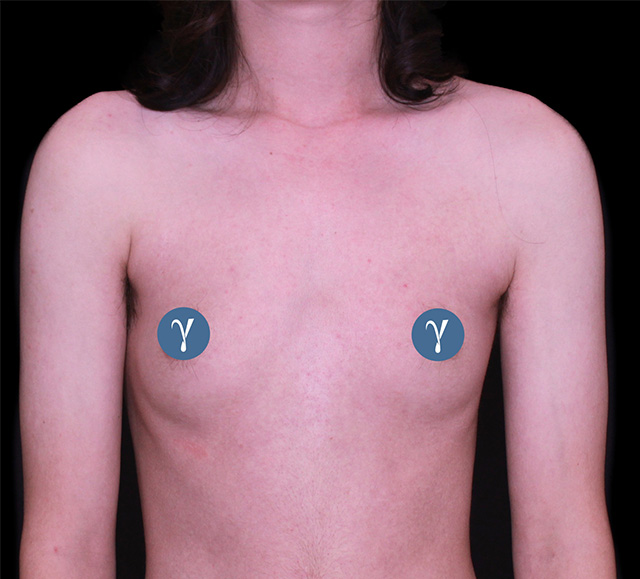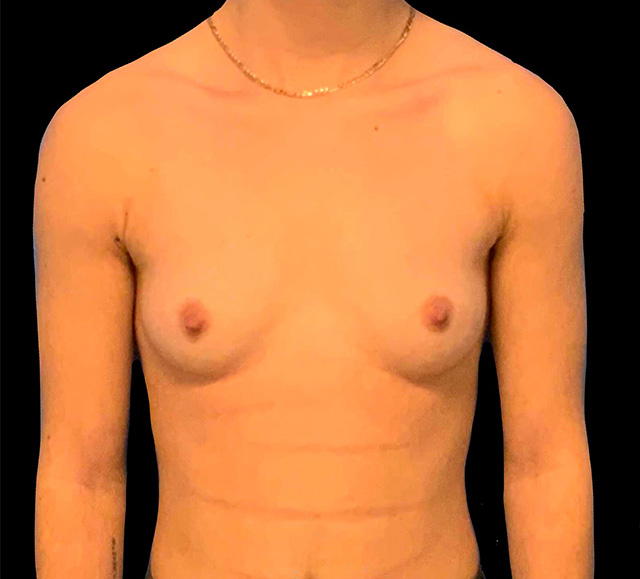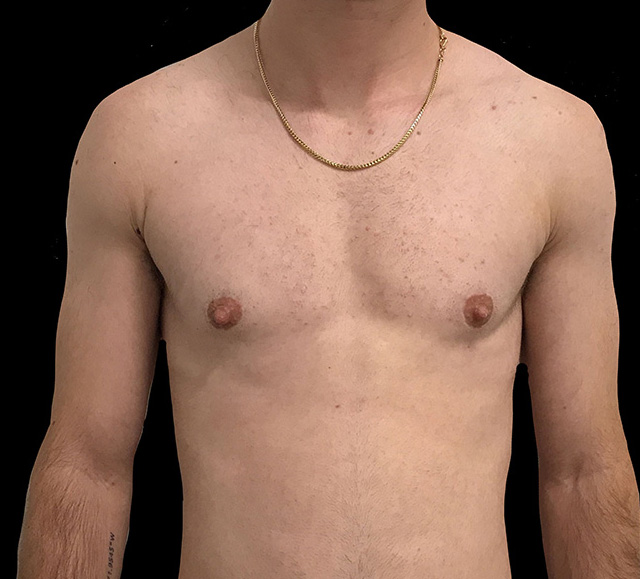What Is Concentric Circle Mastectomy?
A keyhole mastectomy, also known as concentric circle top surgery, is a gender-affirming procedure designed for patients with smaller chests and good skin elasticity. This technique involves a small incision at the edge of the areola through which breast tissue is removed while preserving the natural nipple placement. Unlike the double incision method, keyhole top surgery does not require free nipple grafts or large incisions, resulting in minimal scarring.
Who Are the Best Candidates?
Ideal candidates for the keyhole technique are healthy non-smokers at a stable weight who have realistic expectations for what top surgery can accomplish in terms of their appearance. They should have a good level of skin elasticity and minimal breast tissue that needs to be removed. (This approach is not typically recommended for those with larger chests.) Dr. Keith and Dr. Marano will provide an in-depth consultation process that includes a physical evaluation and review of your medical and surgical history to make sure your procedure will be safe, effective, and able to meet your goals.
How Should I Prepare for Concentric Circle Mastectomy?
Taking the following steps will help ensure your treatment process is seamless and stress-free:
- Provide Mental Health Letter – Many insurance providers and surgical guidelines require a letter from a qualified mental health professional confirming a diagnosis of gender dysphoria and the patient’s readiness for surgery. This letter should follow WPATH (World Professional Association for Transgender Health) standards and address the patient’s understanding of the procedure and its implications. Our team will assist in ensuring the proper language is used and the provider is appropriately credentialed
- Quit Smoking – Nicotine constricts blood vessels and significantly increases the risk of complications, including poor wound healing and tissue loss. Patients must stop using all nicotine products—including cigarettes, vapes, nicotine patches, and gum—at least 4-6 weeks before and after surgery.
- Manage Medications – You may be asked to discontinue certain medications that increase surgical risks.
- Well-Controlled Medical or Mental Health Issues / Medical Clearance – To ensure safe surgery and recovery, patients with underlying medical conditions such as diabetes, high blood pressure, or psychiatric conditions should have them well-managed. Medical clearance from a primary care provider or specialist is required.
- BMI Cutoff – There is no strict BMI cutoff for keyhole top surgery at GAMMA. However, this procedure is best suited for patients with smaller chests and minimal excess skin. Patients with larger chests may require a different technique for optimal results.
- Insurance Coverage – GAMMA works with various insurance providers to help patients access gender-affirming surgery. Our team assists with insurance verification, prior authorization, and necessary documentation. Patients should check with their insurance carrier regarding coverage criteria, including mental health letters and medical clearance requirements.
- Complete Your Consultation – You will undergo a detailed consultation with Dr. Keith or Dr. Marano to ensure your expectations are realistic and your health supports the treatment process. Our team will discuss the risks and benefits, recovery and results, of top surgery.
- Schedule Help – For the first 24 – 48 hours after surgery, a responsible adult will drive you home and assist you with basic chores. You should also prepare your home environment to support your recovery process.
What to Expect On the Day of Surgery
On the day of surgery, patients should arrive at the surgical center on time and follow pre-operative fasting instructions. Here’s what to expect:
- Check-In and Pre-Op Preparation – You will check in at the surgery center and complete any final paperwork. A nurse will take your vital signs and place an IV for fluids and medications. You will meet with your surgeon for final markings on your chest, which will guide the incisions. An anesthesiologist will discuss general anesthesia and answer any questions before administering sedation.
- During the Surgery – The procedure typically lasts 2.5-3 hours under general anesthesia. A small incision is made along the lower edge of the areola, through which breast tissue is removed. The nipple-areolar complex remains attached to the chest, and no free nipple grafting is required. Because there is no excess skin removal, skin retraction occurs naturally over time.
- Post-Op Recovery at the Surgery Center – After surgery, you will wake up in the recovery area, where nurses will monitor your vitals. You will be wearing a compression garment to help reduce swelling and support healing. Once you are stable and alert, you will be discharged the same day with detailed post-operative instructions.
- Leaving the Hospital or Surgery Center – A responsible adult must accompany you home or to your recovery accommodation. You cannot take public transportation or drive yourself. You may feel groggy from anesthesia, and mild discomfort is expected. Pain medication will be provided as needed. It is essential to rest, stay hydrated, and follow all aftercare instructions.
Sensation After Keyhole Top Surgery
Since the nipple-areolar complex remains intact, sensation loss is much less common with keyhole top surgery compared to double incision techniques. However, temporary numbness or altered sensation may still occRecovery times can vary depending on your individual healing abilities and the details of your surgery. In general, you can expect the following sequence of events:
Recovery From Surgery
- Pain Management – Most patients experience moderate pain in the first few days, which gradually decreases. Pain is managed with prescribed medications and over-the-counter options as needed.
- Drains – Drains are placed to prevent fluid buildup and are typically removed within 7–10 days post-surgery.
- Dressings & Showering– A compression garment or dressings will be applied immediately after surgery. This garment will stay in place until your follow up appointment. During this time, dressings must stay dry and showering is not allowed.
- Activity Restrictions: Patients must avoid heavy lifting, strenuous exercise, and raising their arms above shoulder level for the first few weeks. Light activities can be resumed once notified by your surgeon
- Time Off Work – Most patients need 2–3 weeks off work, depending on their job and recovery speed. Jobs requiring heavy physical activity may require a longer recovery period.
- Post-Op Appointments – Follow-up visits are crucial to monitor healing. Patients typically have appointments at 1 week, 1 month, and 6 months, and 12 months post-op. Virtual check-ins are available for out-of-town patients.
Insurance Considerations & Requirements
Insurance carriers will typically cover gender affirmation surgery, including FTM top surgery, when it is performed to treat gender dysphoria, a condition in which the patient’s outer traits do not reflect their authentic gender identity. You’ll need a letter from a mental health provider detailing your decision to undergo top surgery and another letter explaining whether or not you are on hormone therapy. Our team can go over the insurance requirements in greater detail during your private NYC consultation.
Traveling from Outside the NYC Area
- Resources – For patients traveling to NYC for surgery, GAMMA provides recommendations for LGBTQ+ friendly accommodations, post-op caregivers, and recovery services. Our team can also assist with logistics such as medical transport and aftercare arrangements.
- Requirements – Out-of-town patients must plan to stay in NYC for at least two weeks after surgery to ensure proper healing and attend necessary post-operative appointments. We encourage having a trusted friend, family member, or professional caregiver for the first few days post-surgery.
What Sets Us Apart?
Our team at Gender Affirming Medical and Microsurgical Associates (GAMMA) in New York City and New Jersey is known for providing the highest-level care in an affirming environment. We utilize today’s most progressive and cutting-edge techniques to provide the highest level of service possible. Our goal is to help transgender, nonbinary, and gender nonconforming individuals achieve their unique appearance goals and thrive with confidence, security, and peace of mind.
Dr. Drew Marano
Dr. Drew Marano is an accomplished, board- certified, and fellowship-trained plastic and reconstructive surgeon who has devoted his career to the art of gender affirmation surgery. He graduated from Rutgers New Jersey Medical School at the top of his class, receiving AOA honors before embarking on a competitive six-year Integrated Plastic and Reconstructive Surgery Residency at Columbia University/Cornell University in New York City. Following his residency, Dr. Marano was selected as the first-ever Harvard University Complex Gender and Microsurgery Fellow, during which time he underwent advanced training in groundbreaking and innovative surgical techniques. He is a prolific author, researcher, and lecturer who has contributed to over 40 publications and presentations at regional and national meetings. Dr. Marano offers ongoing support for transgender patients as they navigate their unique and rewarding journey of transitioning.
Dr. Jonathan Keith
Dr. Jonathan Keith is a renowned, fellowship-trained, board-certified plastic surgeon known for his progressive approach to microvascular surgery. He is an active member of the World Professional Association for Transgender Health and the founder of the Rutgers Center for Transgender Health. In 2018, Dr. Keith created the first multidisciplinary clinical program for transgender patients in New Jersey and was the first surgeon in the state to perform a female-to-male phalloplasty for gender affirmation. Regarding his extensive educational background, Dr. Keith completed a demanding seven-year residency at the University of Pittsburgh, one of the nation’s most elite and well-regarded plastic surgery training programs. As a testament to his skill and artistry, in 2012, he received the Stephen S. Kroll Fellowship in microsurgery at the University Hospital of Gent, Belgium. Today, Dr. Ketih performs a range of complex and delicate procedures to assist transgender and nonbinary individuals in achieving their ideal appearance, including DIEP flaps for breast reconstruction, vaginoplasty, and phalloplasty.
What Are the Risks Associated with Gender Affirming Mastectomy?
While double incision top surgery is generally safe, all surgical procedures carry some risks. Understanding potential complications helps patients make informed decisions.
- Pain – Postoperative discomfort is common but manageable with prescribed medications and proper rest.
- Hematoma – A collection of blood under the skin that may require drainage.
- Seroma – A buildup of fluid that may need aspiration in follow-up visits.
- Infection – Rare but can be treated with antibiotics or, in severe cases, additional procedures.
- Wound Separation / Nipple Tissue Loss– Incisions or nipples may take time to heal, with a small risk of partial tissue loss.
- Dogears or Contour Irregularities – Excess tissue at the incision ends may require revision surgery.
- Sensation Loss – Temporary or permanent changes in chest sensation are possible.



